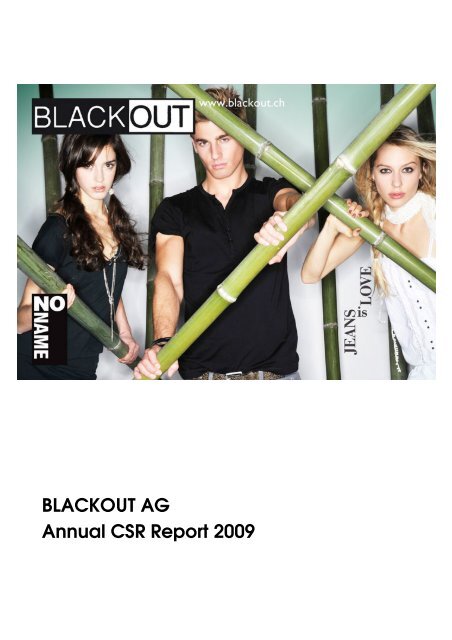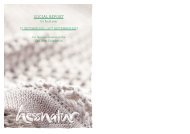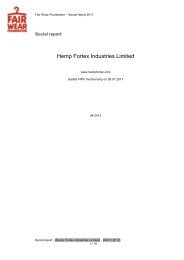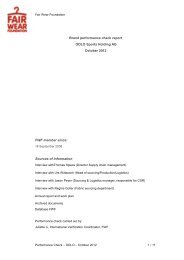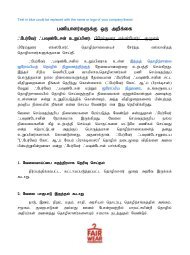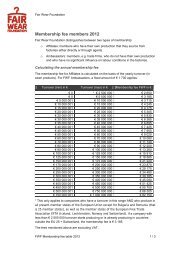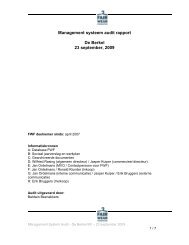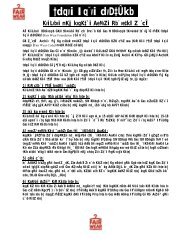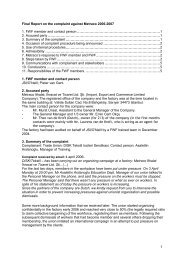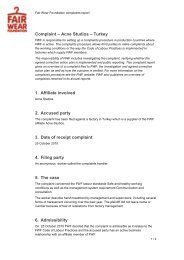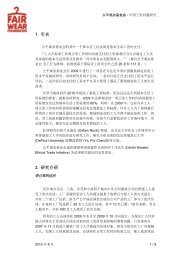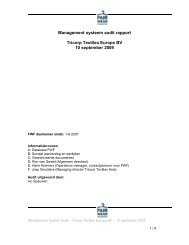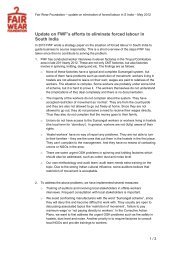Blackout - Fair Wear Foundation
Blackout - Fair Wear Foundation
Blackout - Fair Wear Foundation
You also want an ePaper? Increase the reach of your titles
YUMPU automatically turns print PDFs into web optimized ePapers that Google loves.
BLACKOUT AG<br />
Annual CSR Report 2009
Content<br />
History 3<br />
Organisation 4<br />
Philosophy / Concept 5<br />
Labels 6<br />
Membership 7<br />
CSR goals 2010 / 2011 8<br />
Social audit<br />
Communication, organisation, transparency<br />
Code of Conduct 9-12<br />
Sourcing Strategy 13-15<br />
Sourcing strategy<br />
Organisation of the sourcing department<br />
Production cycle<br />
Pricing<br />
Selection of new factories<br />
Integration monitoring activities and sourcing decision<br />
Coherent system for monitoring and remediation 16-18<br />
Training and capacity building 19<br />
Activities to inform staff members<br />
Activities to inform agents / manufactures and workers<br />
Transparency & Communication 20<br />
Conclusions 2009 and outlook for 2010 21<br />
2
History<br />
BLACKOUT is a Swiss family-owned business. Its foundations were laid in 1963, when Mr Erich<br />
Metzler opened a first shop in Aarburg, Switzerland, and later on additional outlets elsewhere<br />
under the name of Metzler-Textil.<br />
In 1990, the 2 nd generation took over the business with the vision to maintain the successful<br />
past strategy while realizing new ideas. The fashion business BLACKOUT was born.<br />
Today, BLACKOUT owns over 75 shops across Switzerland and has around 400 employees.<br />
BLACKOUT sells trendy garments for young and fashion-conscious people.
BLACKOUT Organisation<br />
Logistics HRM<br />
Headquarter (national company) BLACKOUT AG, Eichengasse 3,<br />
CH-4702 Oensingen<br />
Founding Metzler Mode<br />
Founding BLACKOUT<br />
Secretary<br />
Board of directors<br />
Marketing/<br />
Expansion<br />
CEO<br />
1963<br />
1990<br />
Personnel Board of directors<br />
CEO<br />
Logistics<br />
HRM<br />
Marketing/Expansion<br />
Sale<br />
Finance<br />
Purchasing<br />
Personnel total at the end of 2009 Around 400<br />
Stores at the end of 2009 75<br />
Sale Finance<br />
More information www.blackout.ch<br />
Purchasing
Philosophy / Concept<br />
BLACKOUT gurantee for quality and good service. The BLACKOUT Fashion should be a source<br />
of amusement. Style for young people and some who are young at heart.<br />
BLACKOUT Fashion<br />
The BLACKOUT Fashion has the distinction of a very good price-performance ratio. BLACKOUT<br />
sell trendy fashion in a proper quality. Style for young people and some who are young at<br />
heart.<br />
BLACKOUT Jeans is Love<br />
BLACKOUT is renowned for Jeans and everything which fit with it. Jeans is Love, a passion, an<br />
attitude and culture. Jeans is more than a piece of fabric. Jeans is like a seconde skin.<br />
Just – Jeans is Love!<br />
BLACKOUT Service delivery<br />
A good service delivery is important for BLACKOUT. Every client should be satisfied altogheter.
BLACKOUT Labels<br />
No Name<br />
G3000<br />
Mijoko<br />
JAM52<br />
PiNK<br />
No Name – Jeans, the trendsetter<br />
through and through. Mix your style<br />
with a fitting Jeans! No Name the<br />
brand for your personality and<br />
image.<br />
G3000 – for a sporting and casual mix.<br />
Confortable casual clothes and<br />
sportswear. Combination for every<br />
day.<br />
Mijoko – the modern and classical<br />
style. Elegant but casual. A lifestyle,<br />
tally with the spirit of the time.<br />
JAM52 – Streetwear Fashion for all<br />
type, who like a positive impression.<br />
Individuality against business. Get your<br />
own style!<br />
PiNK – has a clear mission: Jansbrand<br />
for cool girls, who are in mode. <strong>Wear</strong><br />
our fashion and show who you are.<br />
Live your life, follow your dreams and<br />
the future is yours!
Membership<br />
Since 2005, BLACKOUT stand up for a corporate social responsibility (CSR). Lots of<br />
institutions were vet and BLACKOUT has decided for <strong>Fair</strong> <strong>Wear</strong> <strong>Foundation</strong>. BLACKOUT is<br />
member since 1.1.2009.<br />
BLACKOUT is involved for social responsibility for human being and environment.<br />
BLACKOUT stand up for fair labour standards for the clothing industry. BLACKOUT is<br />
involved and undertake to implement the code of conduct and try to generate by<br />
courtesy of the corrective Action Plan (CAP) an improvement within the time limit<br />
prescribed for human being and environment.<br />
BLACKOUT use the following methods for the verification, if the code of conduct is<br />
implemented correctly.<br />
• Grievance procedure anonymous for employee<br />
• Consultation of national organisation (employer’s representative and<br />
organisation of Human Rights)<br />
• Social audits in association with <strong>Fair</strong> <strong>Wear</strong> <strong>Foundation</strong>.<br />
• Management System Audit of the stakeholder.
CSR goals 2010 / 2011<br />
The BLACKOUT CSR goals for the year 2010 defines the following milestones:<br />
Social audits / Corrective Action Plan (CAP)<br />
• Steady improvements of the working conditions in the factories.<br />
• We would like to do some more audits in China.<br />
• In 2011, social audits in Turkey would take place.<br />
• Follow up on Corrective Action Plan as the outcome of social audits.<br />
Communication, organisation, transparency<br />
• A faire partnership and cooperation with suppliers, agents and subsidiaries.<br />
• To maintain the BLACKOUT Code of conduct.<br />
• Internal communication (headquarter), information about the improvments.<br />
• Examination of a FWF-Hangtag on the clothes at a later time.
BLACKOUT Code of Conduct<br />
BLACKOUT is member at <strong>Fair</strong> <strong>Wear</strong> <strong>Foundation</strong> since 1 st of January 2009. This code contains a<br />
set of internationally accepted labour standards, and these should be observed in all the<br />
workplaces where our garments are produced. The <strong>Fair</strong> <strong>Wear</strong> labour standards are based on<br />
the conventions of the International Labour Organisation (ILO) and the Universal Declaration<br />
on Human Rights. In the text below references are made to specific conventions. Where<br />
clarifications of ILO Conventions are required, the <strong>Fair</strong> <strong>Wear</strong> <strong>Foundation</strong> follows ILO<br />
Recommendations and existing jurisprudence.<br />
• Employment is freely chosen<br />
There shall be no use of forced, including bonded or prison, labour. (ILO<br />
Conventions 29 and 105)<br />
• There is no discrimination in employment<br />
Recruitment, wage policy, admittance to training programs, employee promotion<br />
policy, policies of employment termination, retirement, and any other aspect of the<br />
employment relationship shall be based on the principle of equal opportunities,<br />
regardless of race, colour, sex, religion, political affiliation, union membership,<br />
nationality, social origin, deficiencies, or handicaps. (ILO Conventions 100 and 111)<br />
• No exploitation of child labour<br />
There shall be no use of child labour. The age for admission to employment shall not<br />
be less than the age of completion of compulsory schooling and, in any case, not<br />
less than 15 years." (ILO Convention 138) "There shall be no forms of slavery or<br />
practices similar to slavery, such as the sale and trafficking of children, debt 2 The<br />
<strong>Fair</strong> <strong>Wear</strong> <strong>Foundation</strong> - Principles and Policies - May 2002 6-2 bondage and<br />
serfdom and forced or compulsory labour. [...] Children [in the age of 15-18] shall<br />
not perform work which, by its nature or the circumstances in which it is carried out,<br />
is likely to harm their health, safety or morals." (ILO Convention 182)
• Freedom of association and the right to collective bargaining<br />
The right of all workers to form and join trade unions and bargain collectively shall<br />
be recognised. (ILO Conventions 87 and 98) The company shall, in those situations in<br />
which the right to freedom of association and collective bargaining are restricted<br />
under law, facilitate parallel means of independent and free association and<br />
bargaining for all workers. Workers' representatives shall not be the subject of<br />
discrimination and shall have access to all workplaces necessary to carry out their<br />
representation functions. (ILO Convention 135 and Recommendation 143)<br />
• Payment of a living wage<br />
Wages and benefits paid for a standard working week shall meet at least legal or<br />
industry minimum standards and always be sufficient to meet basic needs of<br />
workers and their families and to provide some discretionary income. (ILO<br />
Conventions 26 and 131). Deductions from wages for disciplinary measures shall<br />
not be permitted nor shall any deductions from wages not provided for by national<br />
law be permitted. Deductions shall never constitute an amount that will lead the<br />
employee to receive less than the minimum wage. Employees shall be adequately<br />
and clearly informed about the specifications of their wages including wage rates<br />
and pay period.<br />
• No excessive working hours<br />
Hours of work shall comply with applicable laws and industry standards. In any<br />
event, workers shall not on a regular basis be required to work in excess of 48 hours<br />
per week and shall be provided with at least one day off for every seven-day<br />
period. Overtime shall be voluntary, shall not exceed 12 hours per week, shall not be<br />
demanded on a regular basis and shall always be compensated at a premium rate.<br />
(ILO Convention 1)
• Safe and healthy working conditions<br />
A safe and hygienic working environment shall be provided, and best<br />
occupational health and safety practice shall be promoted, bearing in mind the<br />
prevailing knowledge of the industry and of any specific hazards. Appropriate<br />
attention shall be paid to occupational hazards specific to this branch of the<br />
industry and assure that a safe and hygienic work environment is provided for.<br />
Effective regulations shall be implemented to prevent accidents and minimise<br />
health risks as much as possible (following ILO Convention 155). Physical abuse,<br />
threats of physical abuse, unusual punishments or discipline, sexual and other<br />
harassment, and intimidation by the employer is strictly prohibited.<br />
• Legally-binding employment relationship<br />
Obligations to employees under labour or social security laws and regulations arising<br />
from the regular employment relationship shall not be avoided through the use of<br />
labour-only contracting arrangements, or through apprenticeship schemes<br />
where there is no real intent to impart skills or provide regular employment. Younger<br />
workers shall be given the opportunity to participate in education and training<br />
programmes.<br />
BLACKOUT has committed itself to correct implementation of that code of conduct:<br />
1. BLACKOUT undertakes to only trade in garments that have been produced under<br />
dignified working conditions.<br />
2. To that end BLACKOUT agrees to implement the <strong>Fair</strong> <strong>Wear</strong> labour standards (section 3)<br />
in its factories and agrees to put sufficient and effective efforts into ensuring that this<br />
code is followed by its contractors, subcontractors, suppliers, and licensees.<br />
3. BLACKOUT undertakes to assure that its contractors, subcontractors, suppliers, and<br />
licensees abide by the standards established in the <strong>Fair</strong> <strong>Wear</strong> <strong>Foundation</strong> Code of Labour<br />
Practices and shall work toward the verification of these standards.
4. BLACKOUT shall stipulate that contractors, subcontractors, suppliers, or licensees who<br />
demonstrably fail to comply with one or more of the standards laid down in the <strong>Fair</strong> <strong>Wear</strong><br />
<strong>Foundation</strong> Code of Labour Practices, take propriate measures to ensure that the<br />
situation is improved. If necessary, the offending party shall be sanctioned by<br />
cancellation of its contract, thus prohibiting it from producing or organising the<br />
production of garments for BLACKOUT.<br />
5. BLACKOUT declares that it agrees to independent verification of its compliance with the<br />
<strong>Fair</strong> <strong>Wear</strong> <strong>Foundation</strong> Code of Labour Practices and in that regard undertakes to follow<br />
the instructions of the <strong>Fair</strong> <strong>Wear</strong> <strong>Foundation</strong>.<br />
6. Disputes regarding the interpretation of this Code of Labour Practices will be handled<br />
according to procedures established by the <strong>Fair</strong> <strong>Wear</strong> <strong>Foundation</strong>.
Sourcing strategy<br />
Sourcing strategy<br />
BLACKOUT has a wide range of products, but the main emphasis is on jeans. The<br />
concentration is at the own production and seek to produce in a few different countries and<br />
suppliers. Its important to look after the long-term partnership with the suppliers. The reason of<br />
this strategy is simple: fewer supplier – fewer energy. The suppliers were visited several times a<br />
year.<br />
Furthermore, BLACKOUT works with agents on the basis of tag on order system.<br />
Organisation of the sourcing department<br />
Das CSR BLACKOUT-Team is as follows:<br />
Sourcing Policy (external communication)<br />
Gerald Metzler (CEO)<br />
Administration (Monitoring, CAP, Complaints, trainings, social report, Workplan)<br />
Jeannine Lanz
Visits / Corrective action plan on the spot<br />
Gerald Metzler<br />
The decision on placing orders is taken in the BLACKOUT purchasing departement.<br />
Kapazitätsmögilchkeiten und Liefertermine werden mit dem Lieferanten abgesprochen.<br />
Production cycle<br />
BLACKOUT generate around 12 collections per year. Manufacturers are informed in advance<br />
about orders about 4 to 6 months (Far East) respectively 1 to 2 months (Turkey).<br />
Example of a collection (Far East)<br />
Design &<br />
Development<br />
Order<br />
Placement<br />
Production Delivery<br />
FOB and<br />
Shop<br />
1 month 1 month 75 days 2 months<br />
The goods have been transported by sea and in exceptions by air (1-2 per year)<br />
Pricing<br />
Importance:<br />
1. Fashion degrees and quality<br />
2. Price<br />
The efficency in the factories does increase with a good organisation and therefore results a<br />
better pricing for both. The code of conduct helps for an better organisation and through<br />
them an improvement in efficiency.
Selection of new factories<br />
New factories will be informed to fill out the questionnaire and to accept the Code of Labour<br />
Practices. It needs convincing and positive discussions with the supplier. It’s important, to<br />
discern the advantage fort he supplier and for BLACKOUT (improvement in efficiency, quality<br />
improvement, improvement of the employee satisfaction). The supplier will informed about<br />
the goals and tasks and he will receive the questionnaire to fill in. If he is agree with the<br />
implementation of the code of labour practise, he have to sign it.<br />
Integration monitoring activities and sourcing decision<br />
The code of conduct is an important criterion in the purchasing departement with regard to<br />
the order placement. BLACKOUT cultivate alwayls open discussions with the suppliers and<br />
agents. The CSR strategy will be a part ot them.
Coherent system for monitoring and<br />
remediation<br />
BLACKOUT would like to convince the suppliers and agents of a social responsibility and an<br />
improvements of working conditions. In our expirience, we can say that the suppliers and<br />
agents have a positive interest at the implementation of the code of conduct. Netherless, it<br />
needs convincing and positive discussions with the suppliers and agents. It’s important, to<br />
discern the advantage fort he supplier and for BLACKOUT (improvement in efficiency, quality<br />
improvement, improvement of the employee satisfaction).<br />
Social Audits by <strong>Fair</strong> <strong>Wear</strong> <strong>Foundation</strong>:<br />
As BLACKOUT wants to perform social audits through an external, indepentent company, it<br />
engages audit teams trained by the FWF to carry out factory audits. 3 producers have been<br />
auditedindependently by the FWF in 2009 in China. In total 40% of the overall value of goods.<br />
In 2010 FWF has already been audited 2 producers. The results are listed under the following<br />
chapter. For everything social exist an corrective Action Plan (CAP).<br />
FWF is informed about all those matter and FWF and support BLACKOUT in a steady<br />
improvement.<br />
Corrective Action Plans (CAPs):<br />
As a follow up on these social audits, we make agreements with the producer regarding an<br />
improvement plan on the basis of the results of the inspection. This follow up is called<br />
Corrective Action Plan (CAP). The corrective action plan of every audit is a current working<br />
paper by what helps define solutions for an increase in improvements. BLACKOUT support the<br />
suppliers and agents, in consideration with the corresponding state law. Moreover, il will<br />
search some solutions in co-operation with FWF and their local partner.<br />
Verifications / Improvements<br />
Primarily, some improvements were made if possible from the BLACKOUT headoffice. In<br />
addition the producers have been visited and inspected one or twice a year by the<br />
BLACKOUT staff (CEO or purchasing departement). During this visit, the improvements were<br />
inspected, other open points on the CAP were discussed and if necessary, we search some<br />
possibilities with local partner.
Complaints procedure<br />
The FWF complaints procedure allows workers, their representatives and other parties to file<br />
complaints about working conditions and the way the Code of Labour Practices is<br />
implemented in factories producing. The complaints procedure is intended as a safety net. If<br />
a complaint is filed and deemed admissible by FWF, BLACKOUT will be contacted. FWF<br />
investigates the complaint.<br />
Management Audit<br />
Once a year, the FWF also audits BLACKOUT in the sense of process support. Devices are the<br />
supplier register and inverviews. The result will be reported.<br />
Workplan<br />
BLACKOUT draws up a workplan every year which is then submitted to the FWF. That<br />
confidential document records which activities are planned for the following year. The<br />
workplan for 2010 was submitted to the FWF on time at the end of 2009.0<br />
Country No of Audit Date of Audit Next audit<br />
planned<br />
China 3<br />
2<br />
März / April 2009<br />
Januar / März 2010<br />
2010<br />
2010
Monitoring activities and outcomes (5 audits total)<br />
Area of reporting Country No. Of<br />
Findings<br />
Open<br />
findings<br />
Code awareness China 3 0 3<br />
No forced Labour China 1 1 1<br />
No discrimination China 1 1 1<br />
Freedom of<br />
association<br />
Payment of living<br />
wages<br />
China 5 5 5<br />
China 5 5 5<br />
Overtime China 4 4 4<br />
Health and safety China 5 5 5<br />
Employment<br />
relationship<br />
China 3 3 3<br />
Closed<br />
findings
Training and capacity building<br />
Activities to inform staff members<br />
We already informed all our staff through the internal newsletter and our website.<br />
The staff which is involved in the execution of monitoring activities will be informed by a<br />
regular internal meeting.<br />
There is a individual meeting before every supplier or agent visit. The CAP is an important aid.<br />
By means of this CAP, it will be strive for a improvement in the factory.<br />
Activities to inform agents / manufactures and workers<br />
The purchasing informed and explain the editions and co-operation with FWF by phone or<br />
during the personal visits at the factory. They explain the process of the questionnaire and<br />
inform about our goals with this co-operation.<br />
Firstly the information for the supplier or agent will be in writing letters and secondly personal<br />
during the trip in the factory. The information will be the implementation of code of conduct,<br />
the goals, strategy and co-operation.
Transparency & Communication<br />
We don’t have to place advertisement at the moment. For the present, we would like to<br />
audit more suppliers (condition in 2010) and realize the improvements. Besides the<br />
communication about the membership is published on our website. A widening in this line of<br />
business is planned.
Conclusions 2009 and outlook for 2010<br />
The condition of social audit have been reached and in 2010 two more factories have been<br />
audited. The producers have signed the code of conduct. New suppliers will be add, as<br />
already mentioned.<br />
BLACKOUT is involved for social responsibility for human being and environment.<br />
BLACKOUT stand up for fair labour standards for the clothing industry in 2010 as well.<br />
BLACKOUT is involved and undertake to implement the code of conduct and try to<br />
generate by courtesy of the corrective Action Plan (CAP) an improvement within the time<br />
limit prescribed for human being and environment.<br />
Editor:<br />
CSR-Team BLACKOUT AG<br />
Gerald Metzler, Jeannine Lanz<br />
BLACKOUT AG, Eichengasse 3<br />
CH-4702 Oensingen<br />
www.blackout.ch


